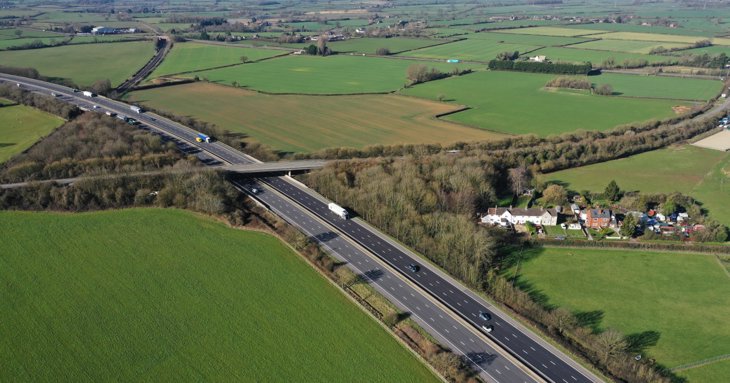Stroud District Council is requesting a pause in the Examination in Public process for its Stroud Local Plan as it addresses planning inspectors' concerns.
The Stroud Local Plan maps out the council's ambitions for the district over the next 20 years — and includes two new settlements in Sharpness and Wisloe to help meet housing needs.
In a letter published by Stroud District Council on Tuesday 29 August 2023, planning inspectors Victoria Lucas and Yvonne Wright expressed concerns over the infrastructure required to deliver the council's proposed plans and recommended withdrawing the Local Plan to step back 'several stages in the plan making process'.
Their concerns include the viability of the public transport plans for a new sustainable settlement built on garden city principles in Sharpness. The council has proposed a new passenger train service as well as a Mobility as a Service (MaaS) scheme, but planning inspectors are not satisfied that either scheme is viable or deliverable.
The letter said: 'The cost of providing a passenger train service has not been audited or agreed with Network Rail or the relevant Train Operating Company (TOC). The costs therefore may well be subject to change. In response to suggestions that the scheme would not meet the criteria to apply for external funding, the developer has said that it would be self-funded by the development. However, this leaves limited flexibility should costs rise as is often the case with infrastructure projects.
'Furthermore, the developer advised that any subsidy for the railway service would end after three years at which point it would be expected to be self-funding. We are not convinced that this would allow a sufficient timeframe for a new service to be established. In addition, the train service would call at Gloucester and would not extend to Bristol, which is an important economic centre. Given that the service would need the agreement of Network Rail and the TOC we are also concerned about the lack of recent engagement. We therefore have concerns that the train service is not viable or deliverable whether it is self-funded or not.
'Whilst additional evidence has been submitted regarding the MaaS scheme, this does not provide indicative costs for implementing such a scheme at Sharpness. We therefore have concerns regarding its likely cost, how it would be funded and whether it would be viable.'
Lucas and Wright expressed concerns about the viability of providing a pedestrian and cycle bridge over the M5 for residents of the new planned settlement at Wisloe, between Cam and Slimbridge, too. As timescales and costs hadn't been agreed with National Highways at the time of the hearing sessions, planning inspectors are worried that costs could end up being higher than anticipated, bringing the viability of the development into question.
The letter said: 'Evidence shows that the provision of this bridge is essential to ensure there is a sustainable pedestrian and cycle route to and from the nearby railway station and to other local services and facilities. Without it, the sustainable accessibility of this new settlement is of concern.
'However, we feel that additional evidence on this issue, could potentially alleviate our concerns. Such evidence would need to demonstrate outcomes from further discussions with National Highways setting out agreed project costs and timescales and provide updated viability evidence for the site.'

They also had fundamental concerns over the Strategic Road Network (SRN), with evidence suggesting that significant improvements would be needed to Junctions 12, 13 and 14 of the M5 to accommodate the planned growth.
They stated that the evidence put forward didn't set out a timescale for when improvements would be required during the plan period, or how they would be funded, despite requesting a project timetable with measurable outcomes and commitments to be agreed with neighbouring councils, the Highways Authority and National Highways.
It also questioned the methodology used by Stroud District Council to calculate the financial contributions from specific developments in the district to the SRN schemes, predicting that the costs for the junction improvement schemes were likely to be significantly higher than identified and would require some form of external government funding to complete, with no such bids being prepared yet and often taking many years to secure.
The letter continued: 'We are mindful of the council’s desire to have a plan in place and recognise the contribution towards sustainable development objectives that having an up-to-date plan in place would make, not least by increasing the supply of housing and employment opportunities which are important government objectives.
'However, such growth must be planned and delivered sustainably. Part of that consideration involves ensuring that the necessary infrastructure will be in place to support that growth.'
Planning inspectors acknowledged the efforts so far and accepted that the council can't resolve these issues by itself, saying that a wider strategic plan is needed, with it ultimately recommending that the council withdraw the draft Local Plan, which would end the current Examination in Public process.
Stroud District Council is now requesting to pause the process for six months instead, to allow it time to look for solutions with its partners, saying that a withdrawal would present 'a significant setback to the chances of timely delivery of infrastructure'.
In its letter responding the the planning inspectors, it highlights that nearly 70 per cent of the housing need for the Local Plan can be delivered without relying on sites which would require the M5 improvement works and doesn't feel that withdrawing the Local Plan is an appropriate course of action.
Leader of Stroud District Council, councillor Catherine Braun, said: 'It is very important to all of us who live and work in Stroud district that we have a Local Plan in place so that we can control where new housing and development takes place. Our draft Local Plan has taken four years to prepare and been through extensive consultation with residents and businesses, parish and town councils in the district.
'If we don’t have a Local Plan to meet central government-imposed housing targets then planning applications in unsuitable locations, and without the community infrastructure that’s needed, will end up getting approved on appeal.'
Chair of Stroud District Council's Environment Committee, councillor Chloe Turner, added: 'I’m pleased that
the planning inspectors do not have any issues with the majority of our draft
Local Plan. It is therefore very surprising and disappointing that they
are suggesting we withdraw the plan. The inspectors have highlighted that
some of the proposed new housing will generate traffic affecting junctions 12
and 14 of the M5.
'However, we have identified how an increase in traffic can be addressed in our response to the inspectors and we’re prepared to work further with local stakeholders to provide additional evidence and other options to help us get this plan over the line. With a six month pause in the timetable for the plan examination, I’m hopeful that we can address the planning inspectors’ concerns.'
Planning inspectors will now need to decide whether to grant Stroud District Council a six-month delay. While their initial letter stated that they were 'not convinced' a lengthy delay would be more effective than withdrawal, they have said that no final conclusions will be made until they have had chance to consider the council's response.





















